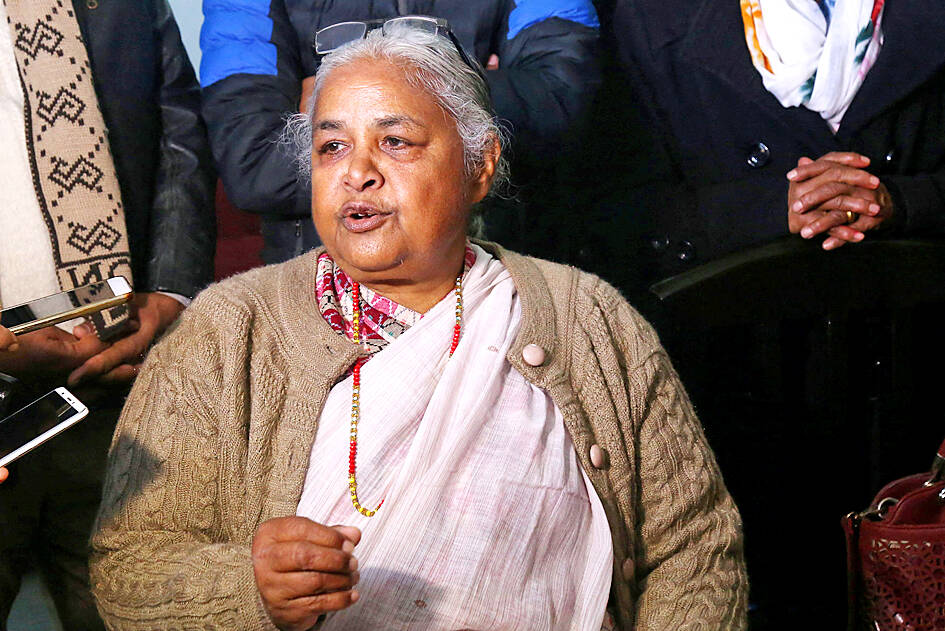Former Nepalese chief justice Sushila Karki is likely to be appointed as interim prime minister, a source aware of the talks said yesterday after intense anti-graft protests led to the resignation of Nepalese prime minister K.P. Sharma Oli.
The Himalayan nation’s worst upheaval in years, which killed 51 people this week and injured more than 1,300 as police fought to control crowds, was sparked by a social media ban, now rolled back. The violence subsided only after Oli resigned.
“Sushila Karki will be appointed interim prime minister,” said a constitutional expert consulted by Nepalese President Ramchandra Paudel and army chief Ashok Raj Sigdel, who sought anonymity as the negotiations are sensitive.

Photo: Reuters
“They [Gen Z] want her. This will happen today,” the source added, referring to the “Gen Z” protesters whose popular name derives from the age of most participants.
Nepal’s first and only female chief justice, Karki, 73, is known for her honesty, integrity and stand against corruption.
Her appointment was likely to be formally made after a meeting at Paudel’s residence after press time last night, a Gen Z source involved in the talks said.
Nepal has grappled with political and economic instability since the abolition of its monarchy in 2008, while a lack of jobs has driven millions to seek work in other countries and send money home.
Shops began reopening yesterday, among signs that normalcy was returning in the capital, Kathmandu, with cars in the streets and police personnel taking up batons instead of the guns they carried earlier in the week.
Authorities began handing over to families the bodies of their loved ones killed in the protests.
“While his friends backed off [from the protests], he decided to go ahead,” Karuna Budhathoki said of her 23-year-old nephew, as she waited to collect his body at Kathmandu’s Teaching Hospital. “We were told he was brought dead to the hospital.”
The 51 dead were 21 protesters, nine prisoners, three police officers and 18 others, police spokesperson Binod Ghimire said, without elaborating.

Right-wing political scientist Laura Fernandez on Sunday won Costa Rica’s presidential election by a landslide, after promising to crack down on rising violence linked to the cocaine trade. Fernandez’s nearest rival, economist Alvaro Ramos, conceded defeat as results showed the ruling party far exceeding the threshold of 40 percent needed to avoid a runoff. With 94 percent of polling stations counted, the political heir of outgoing Costa Rican President Rodrigo Chaves had captured 48.3 percent of the vote compared with Ramos’ 33.4 percent, the Supreme Electoral Tribunal said. As soon as the first results were announced, members of Fernandez’s Sovereign People’s Party

MORE RESPONSIBILITY: Draftees would be expected to fight alongside professional soldiers, likely requiring the transformation of some training brigades into combat units The armed forces are to start incorporating new conscripts into combined arms brigades this year to enhance combat readiness, the Executive Yuan’s latest policy report said. The new policy would affect Taiwanese men entering the military for their compulsory service, which was extended to one year under reforms by then-president Tsai Ing-wen (蔡英文) in 2022. The conscripts would be trained to operate machine guns, uncrewed aerial vehicles, anti-tank guided missile launchers and Stinger air defense systems, the report said, adding that the basic training would be lengthened to eight weeks. After basic training, conscripts would be sorted into infantry battalions that would take

GROWING AMBITIONS: The scale and tempo of the operations show that the Strait has become the core theater for China to expand its security interests, the report said Chinese military aircraft incursions around Taiwan have surged nearly 15-fold over the past five years, according to a report released yesterday by the Democratic Progressive Party’s (DPP) Department of China Affairs. Sorties in the Taiwan Strait were previously irregular, totaling 380 in 2020, but have since evolved into routine operations, the report showed. “This demonstrates that the Taiwan Strait has become both the starting point and testing ground for Beijing’s expansionist ambitions,” it said. Driven by military expansionism, China is systematically pursuing actions aimed at altering the regional “status quo,” the department said, adding that Taiwan represents the most critical link in China’s

‘REALLY PROUD’: Nvidia would not be possible without Taiwan, Huang said, adding that TSMC would be increasing its capacity by 100 percent Nvidia Corp CEO Jensen Huang (黃仁勳) on Saturday praised and lightly cajoled his major Taiwanese suppliers to produce more to help power strong demand for artificial intelligence (AI), capping a visit to the country of his birth, where he has been mobbed by adoring fans at every step. Speaking at an impromptu press conference in the rain outside a Taipei restaurant, where he had hosted suppliers for a “trillion-dollar dinner,” named after the market capitalization of those firms attending, Huang said this would be another good year for business. “TSMC needs to work very hard this year because I need a lot